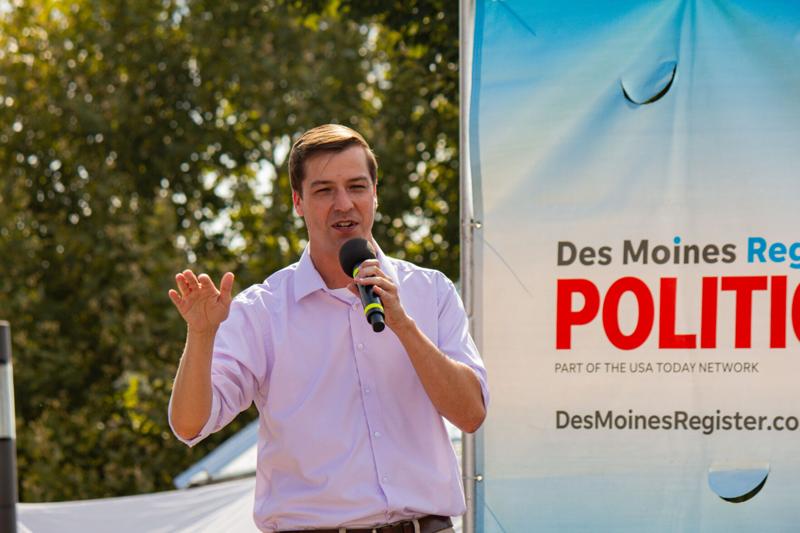Both Vice President Kamala Harris and former President Donald Trump have outlined spending plans that would add trillions in federal spending.
Libertarian candidate Chase Oliver pledged not to add a dime in debt while addressing decades of federal deficit spending. Harris and Trump have not put forward plans to address the federal debt ahead of the Nov. 5 election.
Oliver, 38, has proposed cutting the federal government down to an affordable size. That would include cuts to popular federal aid programs and significant cuts to military spending. He said his major-party opponents are only looking at the near future.
“That is the very short-sighted nature of American politics that we only look to the next election cycle to see if we can win the next one,” he told The Center Square. “We don’t really think long term. I think that’s to the detriment of our economy, with the mounting debt and deficit.”
Both Trump and Harris want to push the debt problem off until some future date, Oliver said.
“They would rather kick the can down the road than address the serious issues that exist today,” he said. “And my argument is there’s going to be pain from getting ourselves to revenue neutral or to deficit neutral. It would have been less painful if we had done it 10 years ago. It’ll be more painful if we attempt it 10 years from now. And so we need serious voices to talk about balancing the budget today.”
The Committee for A Responsible Federal Budget, a nonprofit group, estimates that both Harris’ plan and Trump’s plan would increase the debt. The group estimated that Trump’s plan would cost more than double Harris’ plan. It also noted areas of marked uncertainty in both candidates’ plans. Harris’ plan would increase the debt by $3.50 trillion through 2035, while Trump’s plan would increase the debt by $7.50 trillion, according to the Committee for A Responsible Federal Budget’s analysis.
Chase said some cuts could be made immediately, while others would take years to implement. He said U.S. Department of Defense spending could be cut right away.
“You can immediately reduce much of the Pentagon spending without reducing our national security or ability to protect ourselves,” Oliver said. “You know, much of that is overseas military aid, weapon systems that we don’t need to be building necessarily. It’s kind of what I call Military Industrial Complex welfare spending.”
Next up for Oliver would be cutting federal duplication and overlap. Overlap and duplication cost taxpayers billions of dollars, according to the U.S. Government Accountability Office’s annual report. The Congressional watchdog identified opportunities to save billions of dollars by reducing overlap, duplication and fragmentation across the federal government.
Oliver would cut whole departments from the federal budget, including the Department of Education.
Federal government waste also is on Chase’s chopping block. The GAO, which serves as the research arm of Congress, estimated annual fraud losses cost taxpayers between $233 billion and $521 billion annually, according to an April 2024 report.
Oliver would also make changes to popular safety-net programs such as Medicare and Social Security. Both are on the path to insolvency. The Trustees projected the Medicare Hospital Insurance trust fund will exhaust its reserves in 2036. The Social Security Old-Age and Survivors Insurance trust fund was projected to be insolvent by 2033.
“When it comes to the nondiscretionary spending, namely Social Security and Medicare, you’re going to have to gradually move ourselves off those programs,” he said. “My Social Security Program platform involves keeping one generation left on Social Security and then sunsetting the program after that.”
Medicare is more tricky, Oliver said.
“As far as Medicare, there’s like 1,000 knots you’d have to untie in terms of how tied up Medicare is into our overall health care system,” the Libertarian said. “And so that would have to be just gradual because you can’t untie all those knots at once. But that would be on the path towards fully removing the government from our health care system.”
Chase knows his plans would face fierce opposition in Congress, but he said the president’s pulpit could be an influential tool. He also said winning the White House isn’t the only goal for the party.
“You invest your vote into the Libertarian Party, you’re helping to build up a true alternative to the two-party system,” Oliver said. “By getting ballot access, major party status and helping us elect local libertarians across the country, you’re helping to build up our bench and build up our party to be a more viable challenger to the two-party system. And I especially think if you live in a deep red or a deep blue state, your investment is more wisely spent – that vote and helping to build up a true challenger so that your one-party state can maybe become a three-party state.”







